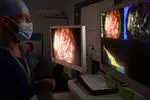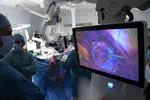Closed Position
Post overview:
- Focus: Support surgical imaging data analysis tasks and work on computational algorithms to help streamline data annotation
- Line manager: Tom Vercauteren
- Salary: Grade 5, £38,482 - £43,249 or Grade 6, £44,355 – £47,882 (max SP34) per annum including LWA depending on experience
- Duration: Fixed term contract until 30 Sep 2025
Post overview:
- Focus: Translational research on hyperspectral-based quantitative fluorescence imaging linked with a neurosurgery clinical study
- Line manager: Tom Vercauteren
- Clinical collaborator: King’s College Hospital
- Industry collaborator: Hypervision Surgical
- Salary: Grade 6, £41,386-£48,414 or Grade 7 £49,737-£55,306 per annum, including London Weighting Allowance
![PhD opportunity [October 2026 start] on "Patient-specific CTA-informed in-silico simulation of interventional fluoroscopy: A digital twin for stroke patients"](/post/2024-11-18-fluoroscopydt-phd/featured_hu_7e64a54a9263e9d3.webp)
![PhD opportunity [October 2026 start] on "Real-time intraoperative polarimetric imaging to detect nerves during brain tumour surgery"](/post/2025-09-29-polarimetry-phd/featured_hu_14efa545ae00abca.webp)

![KDC Africa PhD studentship [October 2025 start preferred - no later than June 2026] on "Resource-efficient slice-to-volume MRI super-resolution reconstruction for improved meningioma management in Sub-Saharan Africa"](/post/2025-01-28-mrireconsssa-phd/featured_hu_6243408d2778cc22.webp)
![PhD opportunity [October 2025 start] on "Machine Learning Tool for Predicting Digital Twin Trajectories of Meningioma Growth on MRI Brain Scans"](/post/2024-11-18-meningiomagrowth-phd/featured_hu_614d4b444e84b2fe.webp)
![PhD opportunity [October 2025 start] on "Computational stereovision synthesis from monocular neuroendoscopy"](/post/2024-09-24-monostereo-phd/featured_hu_73f69e9de90cac99.webp)
![PhD opportunity [October 2024 start] on "Text promptable semantic segmentation of volumetric neuroimaging data"](/post/2023-10-04-textpromptseg-phd/featured_hu_74717dac224f3504.webp)


![[Job] Research Coordinator - King's College Hospital NHS Foundation Trust](/post/2022-12-01-researchcoordinator/featured_hu_a65c931746e06099.webp)